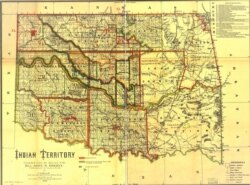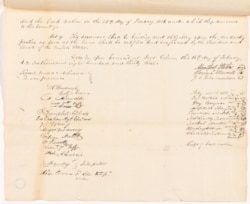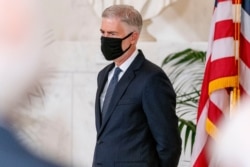Emotions are running high in the U.S. state of Oklahoma one year after the most important Indian law decision in a century: In July 2020, the U.S. Supreme Court ruled that Congress had never formally disestablished the Muscogee (Creek) Nation in Oklahoma, created by an 1833 treaty and extending across the eastern half of the state.
Though the Supreme Court's decision applies only to criminal jurisdiction, it has the potential to expand beyond into environmental and energy arenas. Further, Oklahoma courts have now extended the ruling to apply to the Cherokee, Chickasaw, Choctaw and Seminole tribes.
All this means that about 1.8 million Oklahomans now reside in Indian Country.
Victory for tribal sovereignty
The case dates to 1997, when a state jury convicted Seminole tribe member Jimcy McGirt of rape and other sexual offenses against a 4-year-old Native girl on the Muscogee reservation. The court sentenced him to two 500-year sentences and life without parole.
Twenty-some years later, McGirt filed for post-conviction relief. He cited the Major Crimes Act, an 1885 law that says when serious crimes are committed by or against a tribal member on tribal or reservation land, only the federal government, not the state, has the right to prosecute him.
Ultimately, the case landed in Washington, where the Supreme Court justices on July 9, 2020, ruled 5-4 in McGirt's favor.
Native Americans hailed the decision as a triumph for tribal sovereignty.
But Oklahoma Governor Kevin Stitt appeared less than thrilled and called for Congress to "put some parameters" on the matter.
Days later, he announced the formation of a "Commission on Cooperative Sovereignty" to study the McGirt decision's impact, stressing the need for the state and tribes to partner and suggesting tribal leaders would sit on the commission.
The commission, however, was made up of former U.S. and state lawmakers, a banker, and two energy company executives, but no tribal representatives.
Stitt defended the commission's makeup, saying, "Well … I'm a member of the Cherokee Nation."
While he is a documented member of the Cherokee tribe, accusations had circulated for some time that his membership is based on fraudulent claims by an ancestor.
Oklahoma stresses the ruling's potential threat to public safety: Because the McGirt ruling was made retroactive, thousands of criminal cases may have to reviewed, posing a strain on state resources.
"Since 2005, the 17 district attorneys from (the eastern) part of the state have told us there's potentially 76,000 cases that are up in question that can be or have to be retried," Governor Stitt told Fox 25 News in a televised May interview.
Stitt cited two cases in which a convicted rapist and a man who beat and robbed an elderly man were released from prison.
"So people are actually being released?" interviewer Dan Snyder asked.
"A hundred percent. A hundred percent there's people being released from prison," Stitt answered.
Robert Miller, a professor at Arizona State University's Sandra Day O'Connor College of Law and a citizen of the Eastern Shawnee Tribe of Oklahoma, says Stitt is overstating the threat.
"I saw the segment," Miller said. "Stitt worded his statement very carefully. To the casual observer, it sounded like 76,000 criminals are now out of jail."
VOA contacted the Oklahoma Department of Corrections to verify the numbers.
"My agency can confirm 129 cases who have seen their conviction dismissed or vacated due to the McGirt decision, including at least 57 released directly to the street with convictions including child abuse, robbery, manslaughter, second-degree murder, shooting with intent to kill, lewd acts with a child, burglary 1st degree and other crimes," spokesperson Justin Wolfe wrote in an email.
Wolfe provided VOA this OKDOC spreadsheet, which lists each conviction as of late July 2021 that has been overturned or vacated. The spreadsheet notes whether individuals were freed to the streets, placed on probation, remanded into federal custory for retrial or were to be tried in tribal courts.
Stitt's communications director, Carly Atchison, told VOA via email that district attorneys are automatically dismissing some cases because they no longer have grounds to prosecute them.
"The total number of cases dismissed is unknown," she said, "as DAs have never had this problem before and do not have the resources or personnel to keep track."
Miller said the U.S. Attorney's Office for the Eastern District of Oklahoma has aggressively prosecuted violent crimes coming out of Indian Country. In April, Acting U.S. Attorney Christopher Wilson announced that a federal grand jury had handed down a whopping 90 felony indictments in a single four-day session.
And in 2020, according to a report in the Tulsa World newspaper, prosecutors in the federal Northern District of Oklahoma obtained more than 290 indictments involving 449 defendants, nearly half of them arising out of the McGirt ruling.
In delivering the final opinion, Justice Neil Gorsuch dismissed fears that "thousands" of criminals were waiting in the wings to have their cases retried. He said many would likely choose to remain in prison rather than risk stricter sentences in federal court.
"Other defendants who do try to challenge their state convictions may face significant procedural obstacles, thanks to well-known state and federal limitations on post-conviction review in criminal proceedings," he said, concluding that either way, "the magnitude of a legal wrong is no reason to perpetuate it."
Tax, regulatory concerns
In late September 2020, then Oklahoma Tax Commission Executive Director Jay Doyle wrote a letter to Stitt's Cooperative Sovereignty Commission, cautioning that the McGirt decision could cost the state millions annually.
That's because, by law, states can't tax income that tribal citizens earn on federally recognized tribal land, nor do tribe members have to pay state sales tax on anything they buy on reservations.
According to Doyle, if the ruling were applied only to the Muscogee (Creek) Nation, the state would lose $60 million in annual income, sales and use taxes; if the ruling were extended to the other four tribes — which it now has been — the state could lose more than $200 million in combined taxes annually.
Oklahoma also worries about losing its power to regulate resource extraction and other development in the state. About one-quarter of Oklahoma's oil and gas wells now lie inside the tribes' reservation land.
In early April, the Interior Department's Office of Surface Mining Reclamation and Enforcement notified Oklahoma that the federal government was taking over regulatory jurisdiction on Indian lands, a move Oklahoma has now challenged in a lawsuit.
All this uncertainty has tempers near boiling, as evidenced during a live-streamed community impact forum held in Tulsa July 13 that elicited boos and hisses from the audience.
Stitt later said he'd like to see McGirt overturned completely so that Oklahoma could be "a viable state going forward."
As for Miller, he blames all the chaos on Oklahoma, for "knowingly exercising jurisdiction over tribes for 114 years, violating its own 1907 constitution and U.S. law."
And, he added, the U.S. shares blame for allowing Oklahoma to do so.








